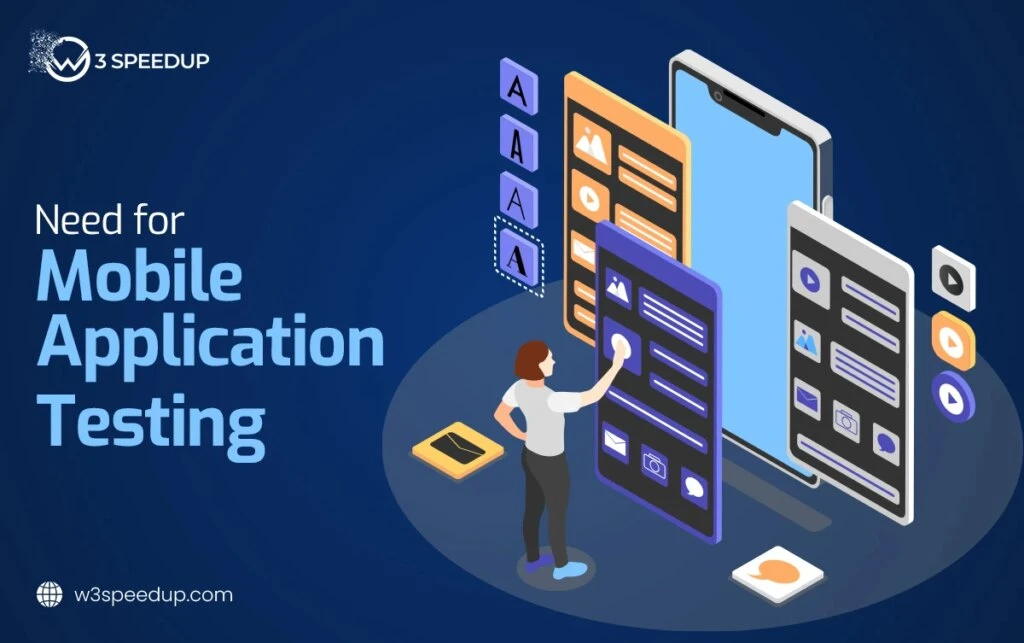Mobile application testing is the process of checking mobile apps to make sure they work correctly and are easy to use. This testing is important because there are many different types of mobile devices, like smartphones and tablets, with various screen sizes and operating systems. Testers look at how the app performs, if it’s user-friendly, and whether it works well on different devices. They also check if the app uses too much battery power or data. Security testing is done to protect user information. Testers try the app in different situations, like when there’s no internet connection or when the user gets a phone call while using the app. The goal is to find and fix problems before the app is released to the public, ensuring a good experience for users.
The Importance of Mobile Application Testing: Key Reasons
 Ensure functionality
Ensure functionality
Mobile app testing helps verify that all features of your app work as intended. Testers check every button, form, and function to make sure users can complete tasks without errors. This process catches bugs and glitches that might frustrate users or prevent them from using the app effectively. For example, testers will ensure that a shopping app allows users to browse products, add items to their cart, and complete purchases without any issues.
 Improve user experience
Improve user experience
A good user experience is crucial for app success in mobile development. Testing helps identify areas where users might get confused or struggle to navigate the app. Testers look at factors like app layout, button placement, and overall design to ensure the app is intuitive and easy to use. They also check for consistency across different screens and features. Mobile development teams use this feedback to refine the user interface and interactions. By addressing these issues before launch, you can create a more enjoyable and efficient experience for your users, encouraging them to keep using your app. This focus on user experience in mobile development can lead to higher user retention rates and better app performance in the competitive mobile market.
 Optimize performance
Optimize performance
Mobile users expect apps to run smoothly and quickly. Performance testing checks how well your app handles different scenarios, such as low battery, poor network conditions, or simultaneous use of other apps. Testers measure app launch time, response time for various actions, and how the app behaves under heavy load. This helps identify and fix performance bottlenecks, ensuring your app runs efficiently even in challenging conditions. For instance, testers might check if a video streaming app can adjust video quality based on network speed to prevent buffering.
 Ensure compatibility
Ensure compatibility
With numerous device models and operating system versions in the market, compatibility testing is essential. This type of testing verifies that your app works correctly on different screen sizes, resolutions, and OS versions. Testers check how the app looks and functions on various devices to ensure a consistent experience for all users. They also test compatibility with different hardware features like cameras, GPS, and sensors. This wide-ranging testing helps you reach a broader audience and prevents negative reviews from users who can’t use your app on their specific devices.
 Enhance security
Enhance security
Mobile apps often handle sensitive user data, making security testing crucial. Testers check for vulnerabilities that could allow unauthorized access to user information or device features. They test data encryption, secure login processes, and how the app handles permissions. Security testing also verifies that the app doesn’t leak data or leave users vulnerable to attacks. For a banking app, for example, testers would ensure that all financial transactions are encrypted and that the app logs users out automatically after a period of inactivity.
 Comply with guidelines and regulations
Comply with guidelines and regulations
App stores and regulatory bodies have specific guidelines and requirements for mobile apps. Testing helps ensure your app meets these standards before submission. Testers check if the app adheres to platform-specific design guidelines, uses approved APIs, and follows data protection regulations like GDPR. They also verify that the app includes necessary features like accessibility options for users with disabilities. Compliance testing can save you time and resources by preventing rejections from app stores or legal issues due to regulatory non-compliance.
Conclusion
Mobile application testing is a vital step in app development. It helps create apps that work well, are easy to use, and provide a great experience for users. By finding and fixing problems early, developers can save time and money. Testing also ensures apps are safe and follow important rules. As mobile devices continue to change and improve, testing becomes even more important. It helps apps stay up-to-date and work on new devices. In the end, good testing leads to better apps that users enjoy and trust. This can result in more downloads, positive reviews, and success for the app in the competitive mobile market.
 Christmas Mega Sale – Enjoy Up to 50% OFF on Every Plan!
Christmas Mega Sale – Enjoy Up to 50% OFF on Every Plan! 


